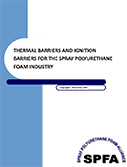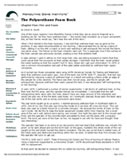All model building codes, including the Massachusetts State Building Code, require the installation of a thermal barrier over spray polyurethane foam on the interior side of a structure. The code definition of an approved thermal barrier is one which is equal in fire resistance to 1/2″ gypsum board. Thermal barriers limit the temperature rise of the foam to not more than 250 degrees Fahrenheit after 15 minutes of fire exposure when subjected to the ASTM E 119 test methods.
Spray Polyurethane foam, like most other organic materials, is combustible. Codes require thermal barriers to reduce the risk of a flash fire and to extend the time at which the foam would reach its auto-ignition temperature should a fire originate from other sources. Although the risk of fire in the building may be remote, it is important to allow this extra time for the buildings occupants to reach a place of safety should there be a fire.
It is the policy of FoamRun that thermal barriers should be installed per code requirements. There are instances when building codes may exclude the installation of a thermal barrier over certain applications of spray foam, but these exclusions are only under very specific situations.
While many spray foam contractors may not be aware of the importance of these code required thermal barriers, FoamRun fully supports the intent of the code in protecting the buildings occupants. You can be assured that we will always address code and safety issues from the outset. Spray polyurethane foam is certainly the best insulation you can use in your home, and if we give due respect to this issue, we will provide the level of safety needed as well.
Please read the articles listed in the sidebar to see why FoamRun fully supports the use of thermal barriers.


